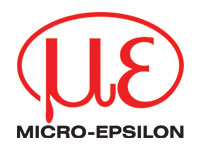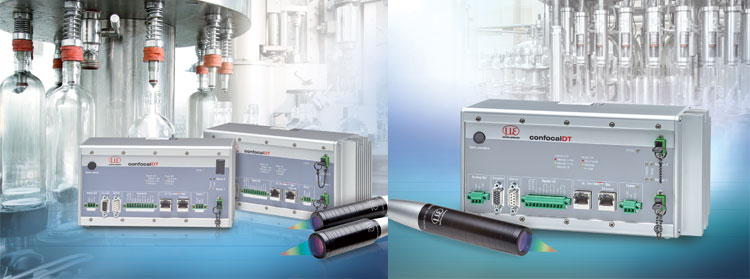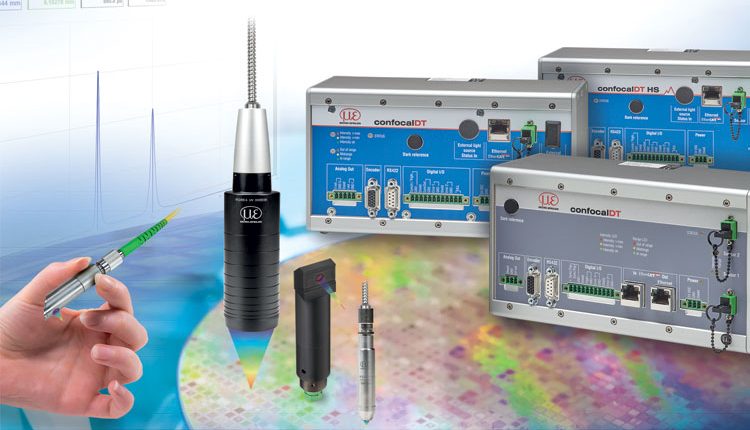 Glass is one of the oldest materials of mankind that has been used for thousands of years. The versatility of glass is still the same but in an age of automation technology, the manufacturing process has changed. In modern glass production, innovative confocal chromatic sensors from the metrology specialist Micro-Epsilon have assumed a central role. They provide sub-micron precision real-time values for thickness, wall strength, gap, roundness and planarity. Monitoring these values using innovative sensors maximizes the quality of the final products.
Glass is one of the oldest materials of mankind that has been used for thousands of years. The versatility of glass is still the same but in an age of automation technology, the manufacturing process has changed. In modern glass production, innovative confocal chromatic sensors from the metrology specialist Micro-Epsilon have assumed a central role. They provide sub-micron precision real-time values for thickness, wall strength, gap, roundness and planarity. Monitoring these values using innovative sensors maximizes the quality of the final products.
In the course of time, the glass manufacturing process has changed. From handmade products and single-item manufacturing, to today’s automated serial production. Tight tolerances need to be maintained in order to produce an impeccable end product for downstream production steps and final customers.
Advantages of confocal chromatic sensors
Extremely high speed processes, high precision and the partly very thin, transparent materials place high requirements on sensors used in the glass industry. The confocalDT series from Micro-Epsilon has specialized on these applications. The sensors are based on the confocal chromatic measuring principle, which is non-contact without influencing the sensitive glass. With these systems, Micro-Epsilon achieves extremely high accuracy in the micrometer range while offering fast measuring rates. With the confocalDT IFC2471 HS, the specialist in sensor technologies has developed the fastest confocal measuring system in the world, offering measuring rates up to 70kHz. In addition, measurements can be performed independent of the distance, which enables accurate measurement values to be achieved even with glass bottles in a star wheel inspection machine. The resulting distance changes between sensor and bottle would normally cause measurement errors, since the refractive index of the transparent material changes with the wavelength. A thickness calibration compensates for deviating measurement values, since the controller uses the refractive indices stored in the material database. This also works with multi-layer targets such as laminated glass. The sensors therefore significantly contribute to improving the product quality in the glass industry and minimizing waste and costs. The extensive portfolio of high precision confocal chromatic sensors and controllers from Micro-Epsilon also enables a wide variety of applications. They are used in container glass and display production, as well as high precision manufacturing of optical glasses.

Flat glass production
Designed specifically for applications in the glass industry, Micro-Epsilon’s new confocalDT IFS2405-6 sensor precisely measures displacement and thickness on diffuse, reflecting and transparent materials. Offering a high resolution at 18nm, the sensor is particularly beneficial in flat glass production, where it measures thickness layers of 300µm. The large offset distance of 63 mm is a particular advantage. The sensor can be placed at a safe distance from the glass sheets fixed on a suspension being moved past the sensor. During this process, the sheets are permanently moving. The large offset distance prevents damage to the sensors and the glass sheets caused by accidental contact.
Container glass production
In container glass production, wall thickness and roundness of the bottles are crucial quality features. In order to minimize the dead weight, the wall thickness is kept as low as possible. Therefore, the wall thickness of each bottle is checked individually. If the wall thickness is not sufficient in one or more places, the glass breaks during bottling, or later during transport. Filling machines in particular work at high speeds, which is why the bottles must be break-proof. Otherwise, glass breakage or splintering would suddenly interrupt the process. High quality requirements also apply to returnable bottles. These bottles are in circulation longer and so must survive several cycles in an undamaged condition.
For the inspection process, the bottles are located in star wheel inspection machines, which rotate them past two confocal chromatic sensors. These sensors measure the thickness of the bottles at two points synchronously and at an accuracy of 10µm. The roundness of the bottles is checked during the same measuring procedure. Due to the high processing speed of five bottles per second and in order to prevent the glass from being damaged, a non-contact measurement procedure is required. The confocal chromatic confocalDT IFC2422 dual-channel controller is used together with sensors from the confocalDT IFS2406-10 series. The sensors are extremely compact and can even be integrated in the smallest of installation spaces. Due to the automatic exposure control, the sensor adapts to different bottle colors. The dual-channel system ensures efficient and reliable wall thickness inspection, particularly in volume production. Two sensors can be connected in parallel to record measured values synchronously. The data is output in real time via the EtherCAT interface.
Conclusion
Due to the non-contact measuring principle, the confocal chromatic sensors from Micro-Epsilon have no influence on the measuring object. They deliver real time values at sub-micron accuracies in high speed production processes. The measuring rate can be set from 6.5kHz to 70kHz, depending on the requirements and the controller. In addition, the micrometer-small light spot size reliably detects the finest of details independent of the distance. Using multi-peak measurements, the sensors also detect the thickness of several layers of glass. The user can also access a material database stored in the controller, which can be expanded and edited. Material-specific parameters such as refractive indices are adapted via the user-friendly web interface. The installation of additional software is not required. Various sensor and controller versions of the confocalDT series can be combined as needed. If the existing product portfolio is not sufficient for an application, Micro-Epsilon offers special custom versions with individual cable lengths, modified measuring ranges or design modifications.
For more information Website: www.micro-epsilon.com



